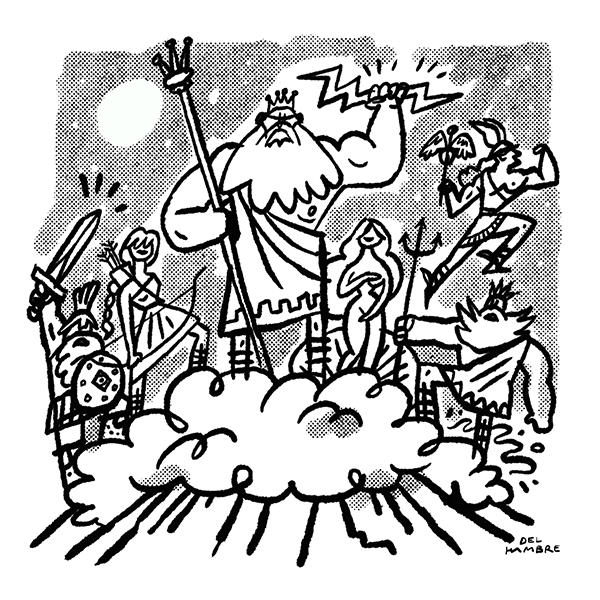All cultures have their own stories about how the earth formed. So did the ancient Greeks. They believed that at the beginning of time the universe was dark and full of energy. They called it Chaos. (Even today the word “chaos” refers to things that have no order.)
From Chaos came Gaia, the mother of all life on earth. She was the mother of Uranus, the god of the sky. Together they created twelve other gods and goddesses known as the Titans. Some of the children of the Titans became the next generation of gods and goddesses. These are the Greek gods and goddesses that most people today recognize. They include Zeus, Hera, Hades, Poseidon, and others. The most powerful of them lived on Mount Olympus, the highest mountain in Greece.
Just as people do today, the Greeks used their myths and religion to explain life, death, and the world around them. Most major modern religions worship one god. The Greeks worshipped dozens of gods and goddesses. Each had a special gift or power. Some ruled weather, nature, and time. Others controlled things such as sleep and dreams. Some wielded mighty weapons such as thunderbolts or tridents. Almost all of the gods and goddesses had interesting stories.
Greek Gods Had Human Faults
Greek gods also fascinate us because they had human faults. Some had fearsome tempers. Others were extremely jealous. A few were simply mean. Greek gods often quarreled with each other. In fact, Zeus, the leader of the gods on Mount Olympus, came to power by overthrowing his cruel father, Cronus. How cruel was Cronus? According to legend, he swallowed his own children so none of them could challenge him! Zeus escaped and later forced Cronus to release the other children he had swallowed. Zeus used thunderbolts as weapons to defeat Cronus.
Even the gods who lived on Mount Olympus had their faults. Zeus had a bad temper. He also had many affairs and fathered many children outside of his marriage. He and his wife, Hera, often quarreled.
Heroes and Adventures
Greek mythology does not end with gods and goddesses. Many human or part-human/part-god figures appear throughout the tales as well. The most famous was Heracles, known for his superhuman strength. Another was Pandora, the first woman created by the gods. Her curiosity brought tragedy. Ordered not to open a jar she received as a wedding gift, she did so anyway. The jar contained evil spirits such as hatred and greed. These spirits were then released into the world. They continue to trouble people even today.
For centuries, students have read Homer’s classic work the Odyssey. This epic poem describes the adventures of Greek hero Odysseus as he returns home from the Trojan war. Many other students have read the tale of greedy King Midas, who wished that everything he touched would turn to gold. His wish came true, but he soon wished it hadn’t. Even the food he touched turned to gold. He would have starved had he not been able to get his wish reversed.
Greek mythology includes many characters and stories that still fascinate people today. That’s one more reason why ancient Greek culture remains a part of modern life.
Written by John Micklos, Jr.
